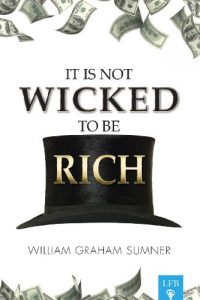
William Graham Sumner (1840-1910) was a sociologist at Yale University, a historian of American banking, and great expositor of classical liberalism. Yes, this is the man often dismissed today as an outmoded “social Darwinist” — and this book shows why it is so important to the statists that his work is not given a fair hearing.
The original title of this book, first published in 1883, was What the Social Classes Owe to Each Other, and it asks a crucially important question: does any class or interest group have the duty and burden of fighting the battles of life for any other class or of solving the social problems to the satisfaction of any other class or group? (The title of this Laissez Faire Books edition, It Is Not Wicked to Be Rich, is taken from Sumner’s argument, and more directly addresses the rhetoric of today.)
Sumner saw that the assumption of group obligation was destined to be a driving force behind the rise of social management in the future. Capital owes labor, the rich owe the poor, producers owe consumers, one sex owes another, one race owes another, this country owes that country, and so on ad infinitum.
How right he was, how incredibly prescient, to see this coming.
The assumption behind all these claims, writes Sumner, is that society consists of layers and layers of hidden and roiling conflicts and fights that can only be resolved by state intervention. These conflicts are rooted in the supposed reality that one group wins only at the expense of another group. The gains of some imply the losses of others. The path to achievement in society is trod over the well-being of others, and, similarly, the plight of underachievers is due to injustice.
So ingrained is this model of society that it is rarely questioned in public life today. Our politics consists almost entirely of the working out of these supposed conflicts and their attendant demands via public policy. Sumner not only tackles this view directly, he makes a strong contrary claim: under freedom, no group is obligated by force to serve another.
He goes further to present a completely contrary model of society, one that highlights the capacity for group cooperation. It is not conflict that forms the basis of society but exchange, goodwill, private property, contract, free association, and liberty — all rooted in the still-radical idea of individualism.
In many ways, this book is pure revelation, an exemplar of how to think about wealth in very confusing times. It was written in the Gilded Age, the closest thing we have to an example of how wealth works in a free society. He was the prophet of the age, the main defender of a market society. In that sense, his views were untainted by the sheer messiness of the 20th century.
The existence of this book also shows that market advocates were highly sophisticated long before the Austrian School came along. Professor Sumner was the progenitor of all great thinkers who came later, but there is a sense in which his writing is purer and even more high level than Hayek and Mises, if only because he was describing a public ideology that was only starting to be challenged by the envious and the socialists of the time.
This new Laissez Faire Books edition with an introduction by Chris Mayer helps to reverse that long-run trend and rehabilitate this remarkable man and mind.
To search for titles from Laissez Faire Books, enter a keyword and LFB; e.g., Economics LFB
Author: William Graham Sumner
Binding: Kindle Edition
Manufacturer: Laissez Faire Books
Number of pages: 68
Product group: eBooks
Studio: Laissez Faire Books
Publication Date: 2012-10-22
Publisher: Laissez Faire Books
Pages: 68
 Swiss Economicblogs.org
Swiss Economicblogs.org
